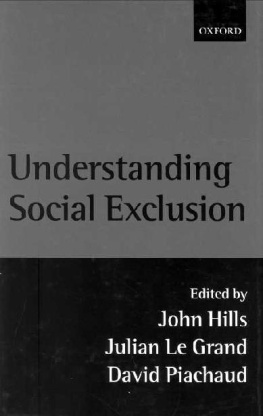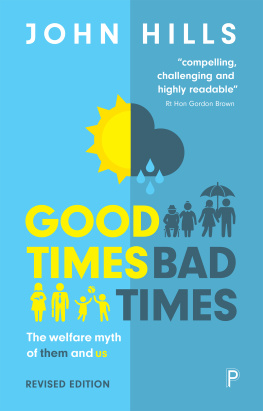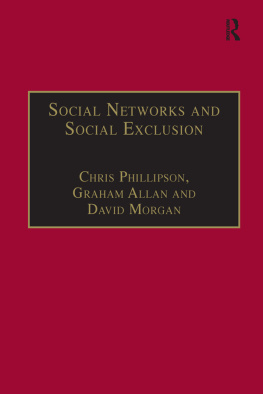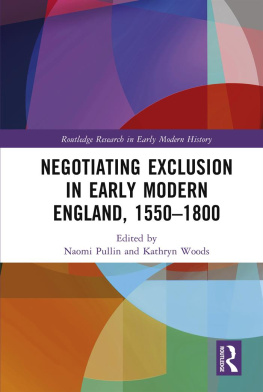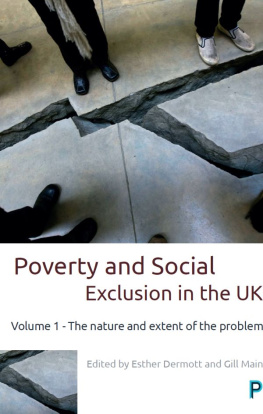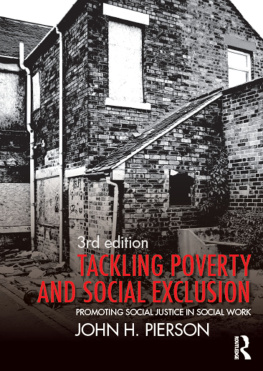John Hills - Understanding Social Exclusion
Here you can read online John Hills - Understanding Social Exclusion full text of the book (entire story) in english for free. Download pdf and epub, get meaning, cover and reviews about this ebook. year: 2002, publisher: Oxford University Press, genre: Politics. Description of the work, (preface) as well as reviews are available. Best literature library LitArk.com created for fans of good reading and offers a wide selection of genres:
Romance novel
Science fiction
Adventure
Detective
Science
History
Home and family
Prose
Art
Politics
Computer
Non-fiction
Religion
Business
Children
Humor
Choose a favorite category and find really read worthwhile books. Enjoy immersion in the world of imagination, feel the emotions of the characters or learn something new for yourself, make an fascinating discovery.
- Book:Understanding Social Exclusion
- Author:
- Publisher:Oxford University Press
- Genre:
- Year:2002
- Rating:5 / 5
- Favourites:Add to favourites
- Your mark:
- 100
- 1
- 2
- 3
- 4
- 5
Understanding Social Exclusion: summary, description and annotation
We offer to read an annotation, description, summary or preface (depends on what the author of the book "Understanding Social Exclusion" wrote himself). If you haven't found the necessary information about the book — write in the comments, we will try to find it.
Understanding Social Exclusion — read online for free the complete book (whole text) full work
Below is the text of the book, divided by pages. System saving the place of the last page read, allows you to conveniently read the book "Understanding Social Exclusion" online for free, without having to search again every time where you left off. Put a bookmark, and you can go to the page where you finished reading at any time.
Font size:
Interval:
Bookmark:


Phil Agulnik
Brian Barry
Tania Burchardt
Simon Burgess
Martin Evans
Howard Glennerster
John Hills (editor)
John Hohcraft
Kathleen Kiernan
Julian Le Grand (editor)
Ruth Lupton
Abigail McKnight
Katharine Mumford
David Piachaud (editor)
Anne Power
Carol Prop-per
Liz Richardson
Jo Sparkes
Holly Sutherland
This hook brings together some parts of the recent research from the ESRC Research Centre for Analysis of Social Exclusion (CASE) at the London School of Economics. The Centre started work in October 1997 and is supported by core funding from the Economic and Social Research Council, whose support made possible much of the work reported here. The authors and editors are very grateful to ESRC for this support and to others who have supported parts of the research, including the Suntory and Toyota International Centres for Economics and Related Disciplines, the Joseph Rowntree Foundation, the Nuffield Foundation, the UNICEF Innocenti Research Centre, and the Gatshy Charitable Foundation. We should also like to thank warmly all those working in local authorities and the NHS, local community groups, and residents who gave their time so generously in answering Ruth Lupton's and others' questions for the areas study. We are also grateful to the Data Archive at Essex University for access to various datasets used in this hook, including the National Child Development Study, the 1970 Birth Cohort Study, the British Household Panel Survey, the Family Expenditure Survey, and the General Household Survey; to the Office for National Statistics, for access to data from the New Earnings Survey; and to the Department of Social Security for the Family Resources Survey and Households Below Average Income dataset. Data from the Family Expenditure Survey are Grown Copyright. They have been made available by the Office for National Statistics (ONS) through the Data Archive and are used by permission. Neither the ONS nor the Data Archive hears any responsibility for the analysis or interpretation of the data reported here.
The chapters of the hook have benefited greatly from comments and suggestions from other members of CASE. We are most grateful for this and for support from Jane Dickson, Nic Warner, and Charles Affor. But our greatest debt is to Rebecca Morris who assembled the whole typescript and consolidated the separate chapters into a form suitable for publication. We are very grateful for this and for all her other efficient assistance during her time at CASE.
John Hills
Julian Le Grand
David Piachaud
London
June 2001
ix
x
xii
Tania Burchardt, Julian Le Grand, and David Piachaud
Brian Barry
Tania Burchardt, Julian Le Grand, and David Piachaud
Simon Burgess and Carol Propper
John Hobcraft
Kathleen Kiernan
Abigail McKnight
Ruth Lupton and Anne Power
David Piachaud and Holly Sutherland
Phil Agulnik, Tania Burchardt, and Martin Evans
Jo Sparkes and Howard Glennerster
Liz Richardson and Katharine Mumford
John Hills
Phil Agulnik is currently working on pension policy for the Department for Work and Pensions. He has recently completed a Ph.D. in the Department of Social Policy at the London School of Economics (LSE) on 'Pension Reform in the UK'. He has also written on the dynamics of tax benefit reform, and the basic income proposal.
Brian Barry is Arnold A. Saltzman Professor in Philosophy and Political Science at Columbia University, New York, and Emeritus Professor of Political Science at the LSE. He is the author of Theories of Justice, justice as Impartiality, and Culture and Equality: An Egalitarian Critique of Multiculturalism. I Iis most recent hook is Why Justice Matters.
Tania Burchardt is a Research Fellow at the ESRC Research Centre for Analysis of Social Exclusion (CASE) at the LSE. She recently published Enduring Economic Exclusion: Disabled people, income and work for the Joseph Rowntree Foundation, and is continuing her research on disabled people and operationalization of Sen's capabilities framework.
Simon Burgess is a Professor of Economics in the Department of Economics at the University of Bristol. His main research interests lie in labour economics, analysis of poverty and household income dynamics, incentives in organizations, and unemployment dynamics.
Martin Evans is a senior Research Fellow in the Department of Social and Policy Studies at the University of Bath. He was previously a Research Fellow at CASE. His research includes cross-national comparisons of social security systems, examination of 'welfare to work' policies in the UK and other countries, the geographical distribution of public spending, and trends in area polarization and disadvantage.
Howard Glennerster is Professor Emeritus of Social Policy at the LSE and Co-Director of CASE. He has written widely on many aspects of social policy although he has specialized in the economics and finance of social policy. His recent hooks include: British Social Policy Since 194.5 (2nd edn.); Paying for Welfare (3rd edn. ); and The State of Welfare: The Economics of Social Spending.
John Hills is Director of CASE and Professor of Social policy at the LSE. His research interests include the distributional effects of tax and welfare systems, income distribution, social security, and housing finance. Recent publications include Paying for Health, Education and Housing: How does the Centre Pull the Purse Strings?, and Public Policy for the 21st Century: Social and Economic Essays in Memory of Henry Neuburger.
John Hohcraft is Professor of Population Studies in the Department of Social Policy at the LSE. His research interests span both developed and developing countries and he has worked extensively on child mortality and fertility. His recent research within CASE is concerned with the emergence of social exclusion through the life-course from childhood to adulthood. He is a member of Academia Europaea and of the Committee on Population of the US National Academy of Sciences.
Kathleen Kiernan is Professor of Social Policy and Demography at the LSE, and Co-Director of CASE. She has published on a wide range of aspects of family life, including teenage parenthood, divorce, cohabitation, non-marital childbearing, lone-motherhood, and the demography of disadvantage. Much of her research uses longitudinal data from the British birth cohort studies and more recently comparative data from a range of European countries. Publications include Lone-Motherhood in the Twentieth Century.
Font size:
Interval:
Bookmark:
Similar books «Understanding Social Exclusion»
Look at similar books to Understanding Social Exclusion. We have selected literature similar in name and meaning in the hope of providing readers with more options to find new, interesting, not yet read works.
Discussion, reviews of the book Understanding Social Exclusion and just readers' own opinions. Leave your comments, write what you think about the work, its meaning or the main characters. Specify what exactly you liked and what you didn't like, and why you think so.

